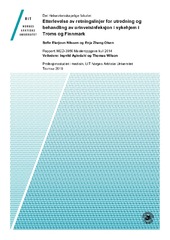Etterlevelse av retningslinjer for utredning og behandling av urinveisinfeksjon i sykehjem i Troms og Finnmark
Permanent link
https://hdl.handle.net/10037/21354Date
2019-06-03Type
Master thesisMastergradsoppgave
Abstract
Background: Studies have shown an overtreatment of assumed urinary tract infection (UTI) in elderly patients in nursing homes. Two factors to be considered in this aspect is the high prevalence of asymptomatic bacteriuria in nursing homes, and non-specific signs and symptoms influencing the diagnostic evaluation of possible UTI.
Method: A retrospective chart review of suspected UTIs in eight nursing homes in Finnmark and Troms Counties was performed. Data collection included signs, symptoms, diagnostic evaluation seven days before and ten days after the antibiotic course, information about antibiotic prescription, urinary culture, and clinical events during and after the course. We compared the decision-making process for suspected UTI in elderly patients in nursing homes with the revised Loeb criteria, and examined to which extent the antibiotic prescribing pathway met the Norwegian guidelines for antibiotic treatment of UTIs in elderly patients in nursing homes.
Results: 111 patients with 388 treated UTIs were included in the study. 16,0% met the revised Loeb criteria. In total, 66,8% of all antibiotics were initiated without symptoms from the urinary tract and could have been avoided. 36,9% of suspected UTIs were initiated based on only positive urine culture without symptoms from the urinary tract. The most common symptoms registered (60,3% of possible UTI cases) were acute mental changes. 41,8% of initiated treatment for suspected UTI met the Norwegian guidelines for antibiotic treatment. The most frequently used antibiotic was pivmecillinam, 52,1% of the cases. 49,0% of inappropriate treatments prescribed were double dosage of pivmecillinam.
Conclusion: The study shows overtreatment with antibiotics for suspected UTIs in nursing homes in Finnmark and Troms counties. Despite evidence based international guidelines for diagnosing UTIs, guidelines are not well known nor seem to be readily available for Norwegian doctors in nursing homes. Additionally, the study shows a surprisingly low adherence to the Norwegian guidelines for antibiotic treatment.
Publisher
UiT Norges arktiske universitetUiT The Arctic University of Norway
Metadata
Show full item recordCollections
- Mastergradsoppgaver Helsefak [1337]
The following license file are associated with this item:


 English
English norsk
norsk
